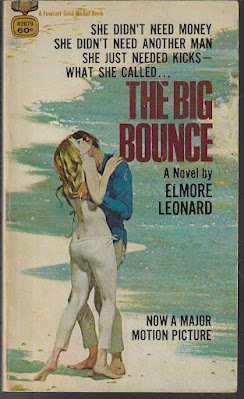Born in New Orleans, Elmore Leonard (1925-2013) began writing successful western fiction in the 1950s. In 1969, Leonard started writing hard-hitting crime novels such as The Big Bounce, The Moonshine War and Fifty-Two Pickup. This is also when Leonard started writing screenplays. After working with Clint Eastwood on Joe Kidd (1972), Leonard started writing the screenplay for Mr. Majestyk. Leonard's original idea was to have Eastwood play the lead. Due to earlier commitments, Eastwood was replaced by Charles Bronson (Steve McQueen was considered) and the film was published by United Artists in July 1974. Leonard penned the film's novelization and it was published in paperback format by Dell.
The book presents Colorado melon producer Vince Majestyk to readers. He won a Silver Star for his heroic service in Vietnam as a U.S. Army Ranger and is now in his second year of farming. After losing money in his first farming year, Majestyk is now in a high pressure situation to successfully harvest his crops to keep the farm afloat. To ensure his success, Majestyk employs experienced Mexican migrants to work on the farm. His work force admires and abides by his commitment.
After a short trip to town, Majestyk returns to the farm to find a low-level hood named Kopas instructing his work force. Kopas says he has hired cheaper work that will save Majestyk money and boost his profits. Majestyk, never accepting anything of this, is shocked by the audacity of the criminal. Eventually, both come to blows and Majestyk takes Kopas's shotgun and drives him away. Later, the police arrive and arrest Majestyk for assault.
Majestyk finds his greatest trouble behind bars. A mafia assassin named Renda is housed with Majestyk and both are transferred to another jail. During the bus journey, Renda's mob operatives try to free him from custody. Instead, Majestyk hijacks the bus and takes Renda to the mountains. It's here that he cuts a deal with the police: his freedom for Renda. In a surprise twist, Majestyk and Renda are both freed. Renda promises Majestyk to kill him for selling him off to the cops.
There's a lot of noble aspects of the Majestyk character. His commitment to Mexican migrants, including fair wages and a secure workplace, his military service and his general good nature regarding the treatment of others is admirable. All of thee characteristics are what attracts a Mexican union representative named Nancy. She falls in love with Majestyk and becomes a major character in the last chapters. I also really liked his relationship with foreman and friend Larry and the respect he slowly receives from law enforcement as the narration expands. Majestyk is an average Joe that readers can easily cheer on.
In terms of violence, both Renda and the mob proves to be worthy adversaries. Majestyk's financial hardships, the stress of farming, and the threats to his livelihood and life are ongoing problems in Leonard's story. The intimidation and interaction between Renda and the low-end thugs is intense and adds another layer to what is already an engaging story.
My only complaint against Leonard's work is the extent to which the police are responding to the escalation of tension and violence. They are simply targets when the mafia easily disrupts the bus journey and they appear incompetent in the arrest of this high-profile mafia assassin in Renda. The roadblocks they structure, the tracking techniques and the weak protection they provide Majestyk are just not plausible.
Overall, Mr. Majestyk is a fine crime-fiction novel (and film) with an engrossing narrative ripe with interesting characters. Leonard's story is convincing and sometimes even draws on the heartstrings. Majestyk's heartbreaking ordeal is essentially the Everyman facing overwhelming adversity. It's this simple and compelling plot that makes Mr. Majestyk so enjoyable.
Buy a copy of this book HERE






